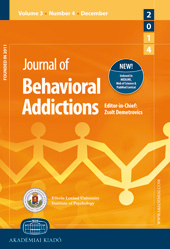Perceived parental permissiveness toward gambling and risky behaviors in adolescents
Perceived parental permissiveness toward gambling and risky behaviors in adolescents
Author(s): Robert F. Leeman, Julie A. Patock-Peckham, Rani A. Hoff, Suchitra Krishnan-Sarin, Marvin A. Steinberg, Loreen Rugle, Marc N. PotenzaSubject(s): Psychology, Behaviorism, Substance abuse and addiction, Health and medicine and law, Family and social welfare
Published by: Akadémiai Kiadó
Keywords: alcohol; cigarette; impulsivity; marijuana; sensation seeking; smoking;
Summary/Abstract: Perceived parental permissiveness toward gambling may relate to adolescents’ engagement in various risky behaviors. To examine this possibility, we analyzed data from a high-school based risk-behavior survey to assess relationships between perceived parental permissiveness toward gambling and adolescent gambling behavior, substance use and related problems. We also evaluated predictions that relationships between perceived parental permissiveness toward gambling and risky behaviors would be particularly strong amongst adolescents reporting high sensation-seeking or impulsivity. Methods: High-school students (n = 2,805) provided data on risky behaviors, perceived parental permissiveness toward gambling, impulsivity and sensation-seeking. Bivariate and logistic regression analyses were conducted to examine relationships with gambling and alcohol, cigarette and marijuana use. Results: Perceived parental permissiveness toward gambling related significantly to adolescent gambling, all substance-use behaviors as well as alcohol and drug problems. There were significant parental-permissiveness-by-sensation-seeking interactions in multiple models. Relationships between perceived parental permissiveness toward gambling and alcohol-use frequency were particularly strong among those with high sensation-seeking. This relationship also applied to gambling and heavy cigarette smoking, albeit to a lesser extent. Impulsivity related strongly to drug problems among those who perceived their parents to be more and less permissive toward gambling. Discussion and conclusions: These findings support the relevance of perceived parental permissiveness toward gambling to adolescent risky behaviors. Parenting perceived as less permissive toward gambling appeared to have protective effects on gambling, alcohol and cigarette use, even among those with high sensation-seeking. Reducing parental permissiveness toward gambling may be a valuable intervention goal, particularly for parents of sensation-seeking adolescents.
Journal: Journal of Behavioral Addictions
- Issue Year: 3/2014
- Issue No: 2
- Page Range: 115-123
- Page Count: 9
- Language: English

